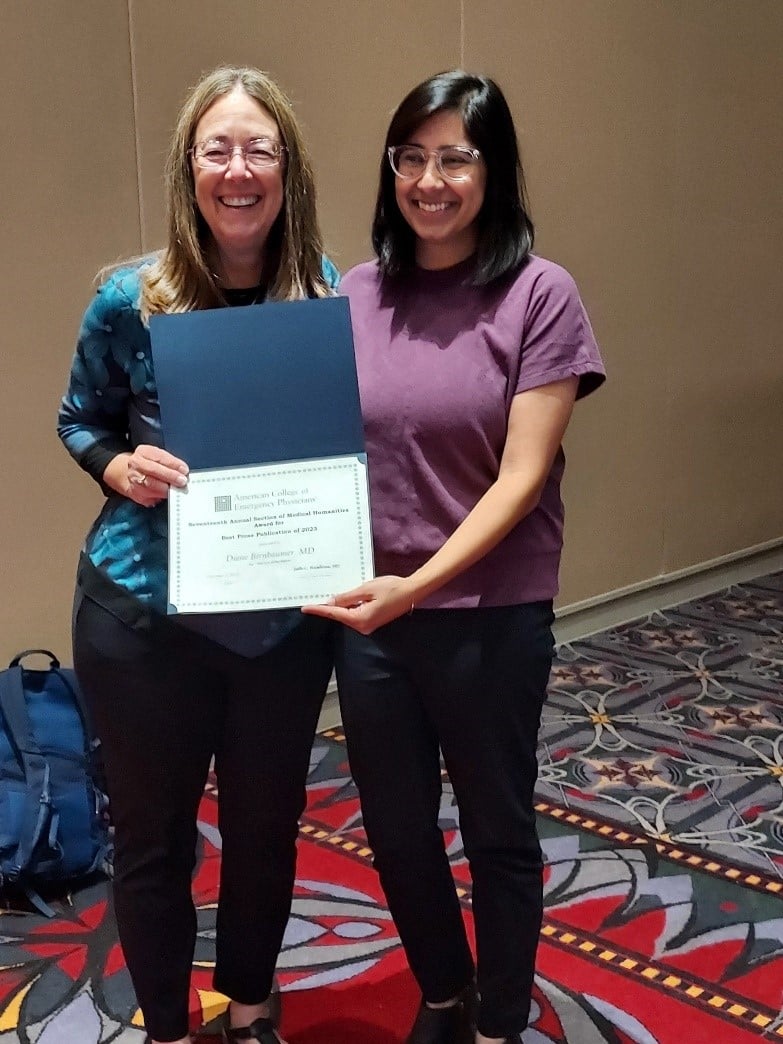
The Eye of the Storm – Winner of the 2023 Writing Award/Prose Division
Diane Birnbaumer, MD, FACEP
He died while dancing. On his 40th birthday. At the gala his family threw for him. Right in the middle of the dance floor.
In the arms of his daughter.
We work on him for over an hour. Try everything we can think of. Nothing works. Absolutely nothing.
I snap one latex glove into the other and tug at my yellow gown, snapping the paper ties around my waist. Rolling it all into a tight bundle, I push the foot pedal to open the lid and shove it all into the trash can. I turn to the members of the resuscitation team and thank them for their work.
Taking several deep breaths, I steel myself. I hate this part.
His numerous family members, resplendent in the brilliant colors of their Samoan heritage, spill from the family room into the hallway. They shift uneasily from foot to foot, stricken. All faces turn my direction, and I am engulfed in the enormity of their emotions.
I introduce myself, and, as gently as I can, I tell them he is gone.
The tsunami of their grief smashes into me and sucks the air from my lungs.
Through the sobbing I hear the honking of a car horn at the ambulance entrance. That kind of laying on the horn usually means one of two things: A gang member shot, sprawled in the back seat of the car, or a baby being born.
Rushing through the door, I find an ancient, oxidized Datsun, its color now indeterminate, pulled akimbo in the ambulance bay. A young man points to the passenger side, his brow creased, his eyes desperate.
I pull the door open to find a young woman with her feet up on the dashboard, sweating, grunting… and pushing.
I pull up her dress to find the wet dark curls of her baby’s hair bulging between her legs. Instinctively I reach forward, and with one deep breath and a push, into my hands she delivers the perfect form of her newborn son.
Behind me a crowd has gathered. A pediatrician materializes at my side holding a warm pastel-colored blanket, open and ready to whisk away the now crying newborn. She hands me the tools and I clamp and snip, separating the mother and child.
Turning my attention to the new mother, I am surprised to find her still grunting and panting. The young man’s brow remains furrowed. I smile at them. “Esta bien. Usted tiene un nino.” He shakes his head, repeating a word I vaguely recall from my medical Spanish class but whose meaning escapes me: gemelos.
The woman’s deep moan quickly jogs my memory: twins.
Just in time, I reach back into the car as another surge of maternal energy thrusts a baby girl into my hands. In a moment of déjà vu, a cord is clamped and cut and a healthy newborn is passed into waiting and capable hands. Other helpful hands lift the exhausted mother from the car and place her on a gurney. The man’s fingers and hers intertwine as he trots alongside as she is wheeled up to labor and delivery
I stand alone at the open door of the car. My hands, hanging at my sides, drip the blood and amniotic fluid that lubricated those children into this world. I hadn’t had time to put on gloves, and my hands grow cold and sticky as the fluids begin to evaporate.
About fifteen feet behind me stands that Samoan family, all of them, a mass of silent witnesses to this spectacle, their faces shiny with tears of loss and wonder, collectively holding their breath. Almost in unison their faces explode into smiles and their turn and hug one another.
One life ended. Two lives began.
I stand silently in the eye of the storm.
Here is Dr. Birnbaumer receiving her award from Dr. Balhara at the section meeting at ACEP23 in Philadelphia.




